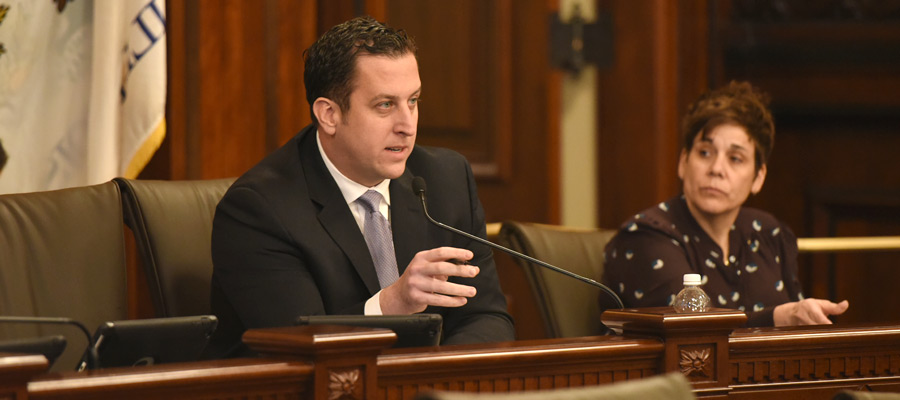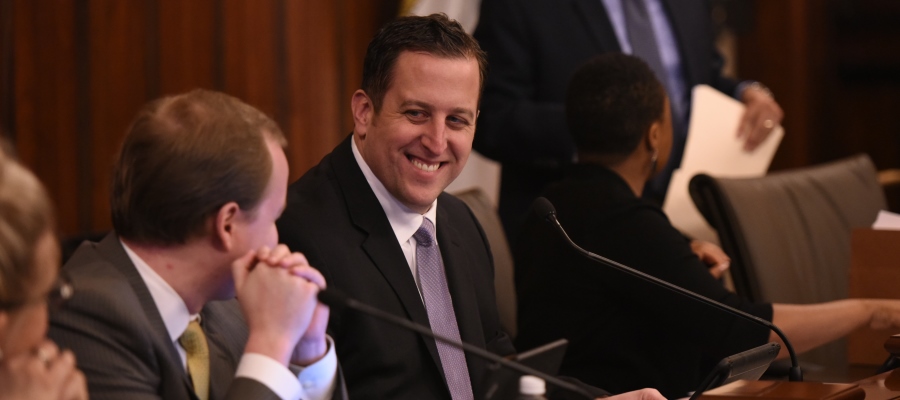- Details
- Category: Press Releases
 TINLEY PARK – A new law sponsored by State Senator Michael E. Hastings (D-Tinley Park) will bring Illinois alimony law up to date with recent developments in the tax code.
TINLEY PARK – A new law sponsored by State Senator Michael E. Hastings (D-Tinley Park) will bring Illinois alimony law up to date with recent developments in the tax code.
Hastings’ Senate Bill 2289 was signed into law Friday, creating a new formula for calculating the amount of alimony an individual should receive after a divorce.
The law was passed in response to the December 2017 federal income tax bill, which prohibits alimony or maintenance payments from being tax deductible for the payer or taxable for the recipient.
“This law institutes responsible and fair changes to Illinois’ divorce laws,” Hastings said. “Courts cannot continue to award the same amount considering the fact there is no longer a tax deduction available to the payer.”
When the tax burden shifts on Jan. 1, 2019, this law will take effect and make modifications to reduce maintenance payments to reflect the tax adjustment. It will not affect previous settlements unless there is a finding of a considerable change in conditions that deserves application of the changes.
Senate Bill 2289 is an initiative of the Illinois State Bar Association and will take effect Jan. 1, 2019.
- Details
- Category: Press Releases

TINLEY PARK—Starting Jan. 1, 2019, Illinois law will require children under the age of two to be properly secured in a rear-facing child restraint seat.
The measure, sponsored by State Sen. Michael E. Hastings (D-Tinley Park) was signed into law Friday.
“Public safety is our number one priority as lawmakers and this measure will ensure our children are safe should disaster strike,” Hastings said.
A 2007 study in the Injury Prevention Journal found that children under age two are 75 percent less likely to die or to be severely injured in a crash if they are in rear-facing seats.
House Bill 4377 requires anyone transporting a child under two years old to secure the child in a rear-facing seat unless the child weighs 40 or more pounds or is more than 40 inches tall.
“One life lost is too many,” Hastings said. “We have solid evidence that will help us save lives. It’s our job as parents to utilize best practices and protect the lives of our children.”
The American Academy of Pediatrics states rear-facing child safety seats give better support to the head, neck and spine of infants by distributing the force of the collision over the entire body.
House Bill 4377 passed the Senate and House with bipartisan support.
- Details
- Category: Press Releases

TINLEY PARK – The state of Illinois now has a procedure in place to alert emergency professionals of missing disabled persons, thanks to State Senator Michael E. Hastings (D -Tinley Park).
Hastings’ Senate Bill 2265, which was signed into law Wednesday, is aimed at reporting, quickly locating and returning missing disabled persons to their homes.
It is motivated by the story disabled man who wandered away from his group in Matteson, Illinois during a group-home outing. When caretakers requested an Amber alert for the man, the authorities said there was no system in place for individuals living with disabilities.
After 21 hours, the man was returned to his caretakers and the incident left advocates wondering if more could be done to protect Illinois’ disabled populations. Hastings worked with the advocates to draft the new law.
“This new commonsense procedure will help us protect individuals living with intellectual and physical disabilities,” Hastings said. “This small change will immediately alert authorities and emergency networkers to bring our loved ones home.”
These individuals will be covered under the Endangered Missing Person Advisory Program, which will provide a regional system for the rapid dissemination of information of missing people.
“If this alert system had been in place, it would not have taken 21 hours to locate that man in Matteson,” Hastings said. “With this law we are giving authorities the tools to effectively disseminate missing persons reports.”
Senate Bill 2265 became law thanks to bipartisan support and will take effect on Jan. 1, 2019.
- Details
- Category: Press Releases
 TINLEY PARK – Gov. Bruce Rauner put the personal information of all Illinois voters at risk on Tuesday by vetoing a measure which would have ended the state’s participation in a controversial, unsecure voter registration system.
TINLEY PARK – Gov. Bruce Rauner put the personal information of all Illinois voters at risk on Tuesday by vetoing a measure which would have ended the state’s participation in a controversial, unsecure voter registration system.
Rauner vetoed Senate Bill 2273 which would prohibit the Illinois State Board of Elections from sharing any voter information with the controversial Crosscheck system or any other interstate voter registration program other than the mandated Electronic Registration Information Center (ERIC).
State Senator Micheal E. Hastings (D-Tinley Park) is outraged at the governor's veto.
“Illinois residents deserve to have the peace of mind that the Illinois State Board of Elections is taking every necessary precaution to protect their sensitive personal information,”Hastings said. “Honest elections are the bedrock of our democracy. I wish Gov. Rauner felt the same.”
Rauner’s veto comes in light of Friday’s news that Russian intelligence officers were charged with hacking into the email servers of the Democratic Party and the Clinton campaign. Illinois state officials said, based on a reference in the indictment, it is likely they also stole voter data from Illinois.
"It's our duty to protect voters' personal and sensitive information and promote impartial and honest elections," Hastings said. “Elections are a sacred component of our democratic process. It is plain and simple – Illinois voters should not have to fear their identity will be stolen if they decide to register to vote. I can’t believe this is up for debate.”
Hastings, who is Chairman of the Illinois Senate's sub-Committee on Cybersecurity, has continued to investigate the 2016 State Board of Election security breach. He said it is important to withdraw from Crosscheck not only for security concerns but also because the program could be used to suppress the minority vote.
"It is clear that Crosscheck is an inferior program that endangers the personal data of all Illinoisans and makes it vulnerable to hackers,” Hastings said. “I don’t understand why Gov.Rauner is open to compromising Illinois’ citizen’s social security numbers, date of birth and other vital information.”
Illinois began using Crosscheck in 2010 when no other alternatives existed. Since then, ERIC has been developed by states concerned over the security of the personal information shared with other programs.
More Articles …
Page 51 of 89


